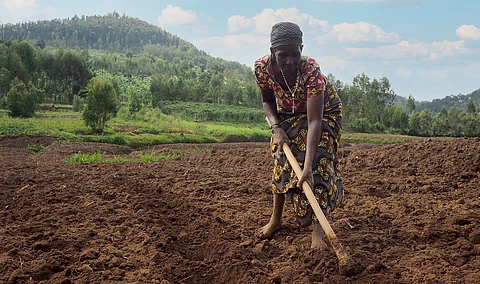

The Extraordinary African Union Summit on the Comprehensive Africa Agriculture Development Program (CAADP) concluded in Kampala, Uganda, on January 11, 2025, with the adoption of the transformative Kampala Declaration for Africa’s agri-food systems from 2026 to 2035.
The new declaration is the successor to the Malabo Declaration, whose implementation period concludes this year.
During the summit, African leaders also endorsed the groundbreaking ten-year CAADP action plan (2026–2035), which outlines a detailed roadmap for transforming agriculture across Africa, a sector deeply vulnerable to climate change impacts. This plan specifies the steps required to achieve the declaration’s goals, including clear implementation and monitoring strategies.
The CAADP’s vision, “Sustainable and Resilient Agri-food Systems for a Healthy and Prosperous Africa,” aligns with Agenda 2063’s goal of achieving “The Africa We Want” and the Africa Common Position on Food Systems. This was also reiterated in the first Africa Climate Summit Declaration of 2023
After two decades, there is a shift from the arrow focus on agriculture-led growth to a broader agri-food systems approach.
The CAADP was officially launched in July 2003 during the Second Ordinary Session of the AU Assembly in Maputo, Mozambique, in response to challenges such as low agricultural productivity, food insecurity, and under-investment in Africa’s agriculture.
At this session, African Heads of State and Government adopted the Maputo Declaration on Agriculture and Food Security, urging AU Member States to allocate at least 10 per cent of their national budgets to agriculture and rural development and to achieve annual agricultural productivity growth of at least 6 per cent. The declaration underscored the importance of enhancing agricultural productivity through increased investment in the sector.
In 2014, the Malabo Declaration expanded the CAADP framework by reaffirming its principles and targets while introducing ambitious new goals, such as eradicating hunger and malnutrition, tripling intra-African trade, enhancing resilience, and strengthening accountability for actions and results. However, according to the fourth Biennial Review Report released by the African Union in February 2024, the continent remains off-track in achieving the commitments outlined in the Malabo Declaration. Notably, ending hunger by 2025, one of the declaration's seven key commitments, has not been met by any Member State, as highlighted in the report.
Africa faces significant food security challenges, with 20.4 per cent of its population experiencing hunger and 58 per cent grappling with food insecurity, according to the FAO’s State of Food Security and Nutrition in the World report.
While there has been progress in reducing stunting rates, malnutrition remains a critical concern, contributing to higher mortality rates and hindering development. Meanwhile, rising obesity and related health issues are adding to the continent’s economic and health burdens.
Without urgent and intensified efforts, Africa is unlikely to meet its goals of ending hunger and malnutrition by 2025 or 2030.
Africa’s agricultural sector has been severely impacted by recent shocks, including the COVID-19 pandemic, internal conflicts, the Russia-Ukraine war, climate change, and corruption. These disruptions underscored the urgent need for a renewed CAADP agenda to transform the continent’s agri-food systems beyond 2025.
In response, the Thirty-Seventh Ordinary Session of the African Union Assembly, held in February 2024, called for the development of a post-Malabo CAADP agenda for 2026-2035. This new framework aims to build resilient agri-food systems capable of addressing these complex challenges and ensuring sustainable growth.
Building on the Maputo and Malabo phases of the CAADP, the post-Malabo agenda adopted in Kampala on January 11, 2025, introduces an agri-food systems approach. This approach empowers stakeholders to tackle challenges across the entire food value chain while aligning policies with broader development objectives.
This strategic shift is based on recognising the complex connections between agriculture, nutrition, economic development, and other sectors. To address trade-offs and inter-linkages, policies must be better integrated, considering sustainable practices from farm to fork, value chain complexity, and the impact on diets and nutrition.
The agri-food systems approach prioritises environmental sustainability to protect future food production and combats all forms of malnutrition—such as under-nutrition and micronutrient deficiencies—by promoting diverse, nutritious, and affordable diets.
Building resilience is crucial for adapting to and recovering from shocks like climate change, pandemics, conflicts, and economic disruptions. While there has been some progress, Africa is facing challenges in this area, with only two countries on track to meet resilience-building targets in 2023. The slow pace of progress in strengthening resilience hinders the achievement of other key goals, including ending hunger, eradicating malnutrition, and reducing poverty.
The summit, which took place from January 9-11, 2025, in Kampala had participation from leaders of Kenya, Ethiopia, Angola, Burundi and Somalia among others. “The extraordinary African Union summit marked the end of the Malabo Declaration on agriculture, replacing it with the new Kampala Declaration that commits member states to modernising their agricultural sectors,” said Kenyan President William Ruto in his statement at the summit.
While Africa is currently the hardest hit by climate change and also has the widest agricultural productivity gaps to close, the ten-year CAADP has set the stage for a new era in African agriculture. It advocates for adoption of climate-smart innovations and technologies to ensure food-security for Africa's population which is projected to double by 2050, reaching approximately 2.5 billion people.